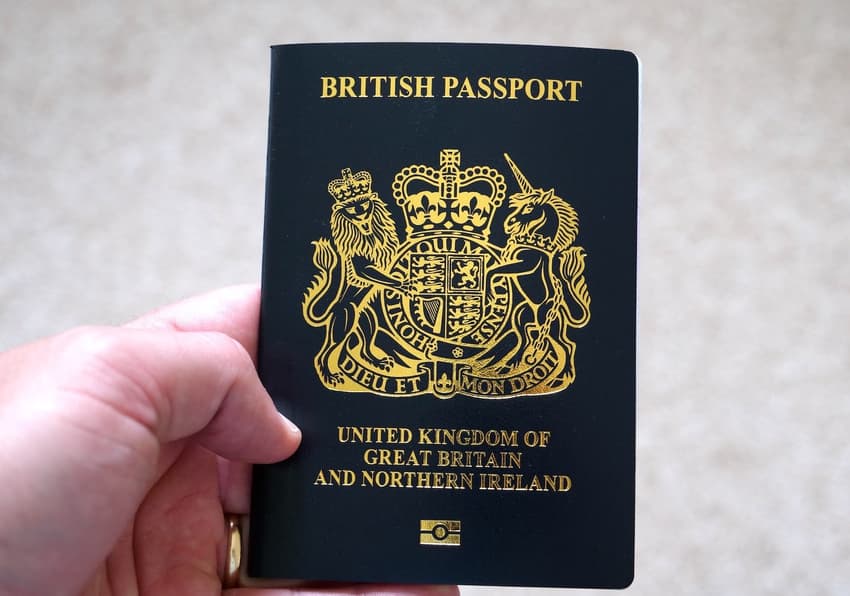EXPLAINED: How can Brits visit or move to Switzerland post-Brexit?

Before Brexit, UK nationals had a nearly unlimited access to Swiss residency and employment. But these rights were curtailed once Britain left the European Union.
After its withdrawal from the EU in 2020, the UK lost many of the privileges it enjoyed as a member of the 27-nation bloc.
While Switzerland is not part of the EU, it is bound by bilateral treaties with Brussels, like the Free Movement of Persons, to adhere to many of its rules.
Consequently, British nationals face the same restrictions in Switzerland as they do throughout the EU — the kind of rules all other non-EU / EFTA citizens must comply with as well.
For UK citizens, the new regulations entered into force from January 2021.
What does this mean in terms of tourism, work or residency?
If you come to Switzerland as a visitor, you can enter the country without a visa.
The only change from pre-Brexit days is that you now must queue up in the ‘All Passports’ lane rather than the one reserved for Swiss and EU / EFTA nationals.
Anyone with a British passport must use this entrance, even people who live in Switzerland with a B or C permit.
If, however, you are a dual UK / Swiss national, and travel with a Swiss passport or ID, then you can use the automated door intended for citizens of Switzerland. The same applies if you hold (and travel with) a passport of a EU country — in this case, you can use that lane as well.
How long can you stay in Switzerland as a tourist?
As any other foreign tourist, you can remain in the country for up to 90 days in any 180-day period.

Entry rules for UK passport holders have changed. Photo: Pixabay
Are you entitled to work in Switzerland?
Yes, but not as freely as before Brexit, and only under certain conditions.
As a non EU / EFTA national, your access to the Swiss labour market (and therefore a Swiss work permit) is much more restricted than in the past.
You will be subject to a system, renewable each year, where the federal government sets a number of quotas intended for third-country nationals and distributes them among cantons.
In 2023, the government released 8,500 quotas for non-European workers: 4,500 for permit B and 4,000 for permit L.
However, UK nationals are privileged in that they receive quotas that are set aside especially for them: 2,100 B and 1,400 L permits.
But just because a certain number of permits are reserved for the Brits, doesn’t mean you will easily get one.
Rules for hiring people from outside the EU / EFTA (including the UK) are strict.
“Authorisations [for work] are issued according to the needs of companies and taking into account the economic interests of Switzerland," according to State Secretariat for Migration (SEM).
You will only be considered for a job (and permit) if you are highly qualified, i.e. if you are a manager, specialist or other skilled professional.
“This means, essentially, that you should have a degree from a university or an institution of higher education, as well as a number of years of professional work experience," SEM said.
And, you must have a job offer in Switzerland — that is, someone who can attest they want to employ you.
Another condition is that your potential employer must prove there is no suitable person to fill the job vacancy from Switzerland or from an EU / EFTA state.
 Outgoing British MEP Jonathan Bulloci holds the Union Jack flag as he and other British pro-Brexit MEPS leave Brussels on January 31, 2020. Photo by Kenzo TRIBOUILLARD / AFP
Outgoing British MEP Jonathan Bulloci holds the Union Jack flag as he and other British pro-Brexit MEPS leave Brussels on January 31, 2020. Photo by Kenzo TRIBOUILLARD / AFP
What if you have financial means to live in Switzerland without working?
It depends on how wealthy you are.
As stated above, non-EU / EFTA nationals are subjected to more restrictive residency rules than their European counterparts.
However, the Swiss are very pragmatic people, especially when it comes to making money.
A little known (except to the financially astute) and rarely used Article 30 of the Federal Aliens Act sets out derogations from the regular, strict admission requirements.
It enables foreigners from outside Europe to move to Switzerland — but only if they are sufficiently wealthy to live here without having to work or resort to welfare benefits.
The law states that in cases of “important public interests” — that is, plenty of money in state coffers— cantons can grant people from outside EU / EFTA states permissions to settle on their territories with a B residence permit.
Obviously, the sky’s the limit and the amounts depend on where in the country you want to live. But just as an indication, “buying” your way into the residency permit in Geneva costs roughly 312,522 francs in tax revenue per year; 415,000 in Vaud; and 287,882 in Valais.
Add to this a fee you would have to pay a specialised relocation attorney — reportedly at least 50,000 francs — to negotiate a lump-sum tax agreement for you with authorities of the canton where you would like to live.
One thing to keep in mind is that money alone can’t buy you residency.
The law also stipulates that you “must not pose a threat to public security and order or to Switzerland’s international relations”.
Additionally, all foreign nationals living in Switzerland — rich and poor alike — must purchase compulsory health insurance coverage.
Are any UK citizens exempted from post-Brexit rules?
Yes, the above rules don’t apply to British nationals who had moved to Switzerland before the end of the Brexit transition period (December 31st, 2020) — they will retain all their existing rights for residence and employment.
Comments
See Also
After its withdrawal from the EU in 2020, the UK lost many of the privileges it enjoyed as a member of the 27-nation bloc.
While Switzerland is not part of the EU, it is bound by bilateral treaties with Brussels, like the Free Movement of Persons, to adhere to many of its rules.
Consequently, British nationals face the same restrictions in Switzerland as they do throughout the EU — the kind of rules all other non-EU / EFTA citizens must comply with as well.
For UK citizens, the new regulations entered into force from January 2021.
What does this mean in terms of tourism, work or residency?
If you come to Switzerland as a visitor, you can enter the country without a visa.
The only change from pre-Brexit days is that you now must queue up in the ‘All Passports’ lane rather than the one reserved for Swiss and EU / EFTA nationals.
Anyone with a British passport must use this entrance, even people who live in Switzerland with a B or C permit.
If, however, you are a dual UK / Swiss national, and travel with a Swiss passport or ID, then you can use the automated door intended for citizens of Switzerland. The same applies if you hold (and travel with) a passport of a EU country — in this case, you can use that lane as well.
How long can you stay in Switzerland as a tourist?
As any other foreign tourist, you can remain in the country for up to 90 days in any 180-day period.

Are you entitled to work in Switzerland?
Yes, but not as freely as before Brexit, and only under certain conditions.
As a non EU / EFTA national, your access to the Swiss labour market (and therefore a Swiss work permit) is much more restricted than in the past.
You will be subject to a system, renewable each year, where the federal government sets a number of quotas intended for third-country nationals and distributes them among cantons.
In 2023, the government released 8,500 quotas for non-European workers: 4,500 for permit B and 4,000 for permit L.
However, UK nationals are privileged in that they receive quotas that are set aside especially for them: 2,100 B and 1,400 L permits.
But just because a certain number of permits are reserved for the Brits, doesn’t mean you will easily get one.
Rules for hiring people from outside the EU / EFTA (including the UK) are strict.
“Authorisations [for work] are issued according to the needs of companies and taking into account the economic interests of Switzerland," according to State Secretariat for Migration (SEM).
You will only be considered for a job (and permit) if you are highly qualified, i.e. if you are a manager, specialist or other skilled professional.
“This means, essentially, that you should have a degree from a university or an institution of higher education, as well as a number of years of professional work experience," SEM said.
And, you must have a job offer in Switzerland — that is, someone who can attest they want to employ you.
Another condition is that your potential employer must prove there is no suitable person to fill the job vacancy from Switzerland or from an EU / EFTA state.

What if you have financial means to live in Switzerland without working?
It depends on how wealthy you are.
As stated above, non-EU / EFTA nationals are subjected to more restrictive residency rules than their European counterparts.
However, the Swiss are very pragmatic people, especially when it comes to making money.
A little known (except to the financially astute) and rarely used Article 30 of the Federal Aliens Act sets out derogations from the regular, strict admission requirements.
It enables foreigners from outside Europe to move to Switzerland — but only if they are sufficiently wealthy to live here without having to work or resort to welfare benefits.
The law states that in cases of “important public interests” — that is, plenty of money in state coffers— cantons can grant people from outside EU / EFTA states permissions to settle on their territories with a B residence permit.
Obviously, the sky’s the limit and the amounts depend on where in the country you want to live. But just as an indication, “buying” your way into the residency permit in Geneva costs roughly 312,522 francs in tax revenue per year; 415,000 in Vaud; and 287,882 in Valais.
Add to this a fee you would have to pay a specialised relocation attorney — reportedly at least 50,000 francs — to negotiate a lump-sum tax agreement for you with authorities of the canton where you would like to live.
One thing to keep in mind is that money alone can’t buy you residency.
The law also stipulates that you “must not pose a threat to public security and order or to Switzerland’s international relations”.
Additionally, all foreign nationals living in Switzerland — rich and poor alike — must purchase compulsory health insurance coverage.
Are any UK citizens exempted from post-Brexit rules?
Yes, the above rules don’t apply to British nationals who had moved to Switzerland before the end of the Brexit transition period (December 31st, 2020) — they will retain all their existing rights for residence and employment.
Join the conversation in our comments section below. Share your own views and experience and if you have a question or suggestion for our journalists then email us at [email protected].
Please keep comments civil, constructive and on topic – and make sure to read our terms of use before getting involved.
Please log in here to leave a comment.